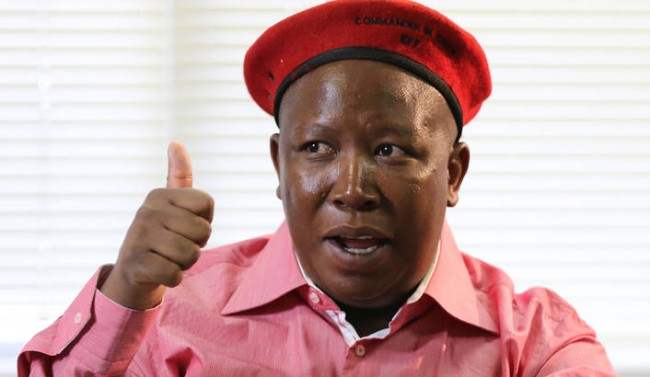JOHANNESBURG, (Reuters) – A judge threw out corruption charges against South African opposition firebrand Julius Malema today, a ruling hailed as a major victory by the vocal critic of President Jacob Zuma.
Malema had been accused of money laundering, racketeering and fraud relating to government contracts. But Judge George Mothle said he had waited too long for his trial after a string of postponements, telling him: “You are free to go.”
Malema, once a leading figure in the ruling African National Congress (ANC), had regularly dismissed the charges as a government attempt to silence him.
“I stand in front of you, an innocent man, without a dark cloud hanging over my head,” Malema told journalists and supporters outside the Polokwane High Court in his northern home province of Limpopo.
Malema was expelled from the ANC in 2012 for ill-discipline, in one of the biggest fractures in the party that dominates South African politics.
He now heads the ultra-left Economic Freedom Fighters (EFF), the second largest opposition group, regularly accuses the government of corruption and presents himself as a champion for impoverished blacks whose lives have changed little since apartheid ended in 1994.

NEW CHARGES POSSIBLE
The judge told him the case had been thrown out, but he had not been formally acquitted, so prosecutors could still charge him again.
Prosecutors said the case related to a government contract worth 52 million rand ($4 million) awarded by a provincial department to a company in which Malema held a stake through his family trust. The contract was for the construction of roads in Malema’s home region.
Malema was accused of “improperly” receiving the cash for the contract in a conspiracy involving state tenders.
Malema, who once headed the ANC’s powerful youth wing and played a pivotal part in Zuma’s rise to power, has since urged the president to pay back millions of dollars of state funds spent on renovating his home.
Opposition parties called the upgrades to Zuma’s rural home lavish and wasteful and Public Protector Thuli Madonsela last year recommended he refund some of the money.
But allies have defended the work, saying a swimming pool was needed for fire-fighting purposes and an animal enclosure was required to prevent cattle and chickens from setting off motion detectors.









